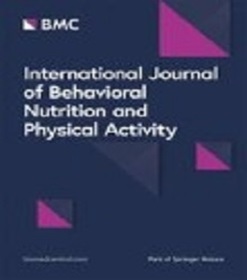Dietary quality and dietary greenhouse gas emissions in the USA: a comparison of the planetary health diet index, healthy eating index-2015, and dietary approaches to stop hypertension
IF 5.6
1区 医学
Q1 NUTRITION & DIETETICS
International Journal of Behavioral Nutrition and Physical Activity
Pub Date : 2024-04-02
DOI:10.1186/s12966-024-01581-y
引用次数: 0
Abstract
The Planetary Health Diet Index (PHDI) measures adherence to the dietary pattern presented by the EAT-Lancet Commission, which aligns health and sustainability targets. There is a need to understand how PHDI scores correlate with dietary greenhouse gas emissions (GHGE) and how this differs from the carbon footprints of scores on established dietary recommendations. The objectives of this study were to compare how the PHDI, Healthy Eating Index-2015 (HEI-2015) and Dietary Approaches to Stop Hypertension (DASH) relate to (a) dietary GHGE and (b) to examine the influence of PHDI food components on dietary GHGE. We used life cycle assessment data from the Database of Food Recall Impacts on the Environment for Nutrition and Dietary Studies to calculate the mean dietary GHGE of 8,128 adult participants in the 2015–2016 and 2017–2018 cycles of the National Health and Nutrition Examination Survey (NHANES). Poisson regression was used to estimate the association of (a) quintiles of diet score and (b) standardized dietary index Z-scores with dietary GHGE for PHDI, HEI-2015, and DASH scores. In secondary analyses, we used Poisson regression to assess the influence of individual PHDI component scores on dietary GHGE. We found that higher dietary quality on all three indices was correlated with lower dietary GHGE. The magnitude of the dietary quality-dietary GHGE relationship was larger for PHDI [-0.4, 95% CI (-0.5, -0.3) kg CO2 equivalents per one standard deviation change] and for DASH [-0.5, (-0.4, -0.6) kg CO2-equivalents] than for HEI-2015 [-0.2, (-0.2, -0.3) kg CO2-equivalents]. When examining PHDI component scores, we found that diet-related GHGE were driven largely by red and processed meat intake. Improved dietary quality has the potential to lower the emissions impacts of US diets. Future efforts to promote healthy, sustainable diets could apply the recommendations of the established DASH guidelines as well as the new guidance provided by the PHDI to increase their environmental benefits.美国的膳食质量和膳食温室气体排放:行星健康膳食指数、健康饮食指数-2015 和防治高血压膳食方法的比较
行星健康膳食指数(PHDI)衡量的是对 EAT-Lancet 委员会提出的膳食模式的遵守情况,该膳食模式将健康和可持续发展目标结合在一起。我们有必要了解 PHDI 分数与膳食温室气体排放量(GHGE)的相关性,以及这与既定膳食建议分数的碳足迹有何不同。本研究的目的是比较 PHDI、健康饮食指数-2015(HEI-2015)和高血压饮食疗法(DASH)与(a)膳食温室气体排放量的关系,以及(b)研究 PHDI 食物成分对膳食温室气体排放量的影响。我们利用营养与膳食研究食品召回对环境影响数据库中的生命周期评估数据,计算了美国国家健康与营养调查(NHANES)2015-2016 年和 2017-2018 年周期中 8128 名成年参与者的平均膳食 GHGE。泊松回归用于估计 PHDI、HEI-2015 和 DASH 分数的(a)五分位膳食得分和(b)标准化膳食指数 Z 值与膳食 GHGE 的关联。在二次分析中,我们使用泊松回归来评估 PHDI 各项得分对膳食 GHGE 的影响。我们发现,在所有三个指数中,膳食质量越高,膳食 GHGE 越低。与 HEI-2015 [-0.2, (-0.2, -0.3) kg CO2-equivalents] 相比,PHDI [-0.4, 95% CI (-0.5, -0.3) kg CO2-equivalents per one standard deviation change] 和 DASH [-0.5, (-0.4, -0.6) kg CO2-equivalents] 的膳食质量与膳食 GHGE 关系的幅度更大。在检查 PHDI 各项得分时,我们发现与膳食相关的 GHGE 主要由红肉和加工肉类摄入量驱动。提高膳食质量有可能降低美国膳食对排放的影响。未来推广健康、可持续膳食的工作可以应用已制定的 DASH 指南的建议以及 PHDI 提供的新指南,以增加其环境效益。
本文章由计算机程序翻译,如有差异,请以英文原文为准。
求助全文
约1分钟内获得全文
求助全文
来源期刊
CiteScore
13.80
自引率
3.40%
发文量
138
审稿时长
4-8 weeks
期刊介绍:
International Journal of Behavioral Nutrition and Physical Activity (IJBNPA) is an open access, peer-reviewed journal offering high quality articles, rapid publication and wide diffusion in the public domain.
IJBNPA is devoted to furthering the understanding of the behavioral aspects of diet and physical activity and is unique in its inclusion of multiple levels of analysis, including populations, groups and individuals and its inclusion of epidemiology, and behavioral, theoretical and measurement research areas.

 求助内容:
求助内容: 应助结果提醒方式:
应助结果提醒方式:


